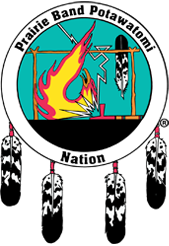November 13, 2013 –

Leaders from the four tribes in Kansas attended the White House Tribal Nations Conference today in Washington, D.C. From left to right is Joyce Guerrero, vice-chairperson for the PBPN, Rachel Kent, treasurer for the Iowa Tribe of Kansas & Nebraska, Brigette Robidoux, chairperson of the Sac and Fox Nation of Missouri in Kansas & Nebraska, and Steve Cadue, chairperson of the Kickapoo Tribe in Kansas.
WASHINGTON, D.C. – Secretary of the Interior Sally Jewell kicked off the 2013 White House Tribal Nations Conference today, welcoming leaders invited from all 566 federally recognized tribes. The fifth conference hosted during the Obama Administration, today’s event at the Department of the Interior will include remarks from President Obama and participation from thirteen Cabinet members and other senior government officials.
“I am proud to work for a President who has demonstrated a lasting and meaningful commitment to upholding a strong government-to-government relationship with tribal nations,” said Secretary Jewell, who also serves as Chair of the recently-established White House Council on Native American Affairs. “This conference is an important part of the ongoing dialogues we need to have as we work together toward tribal self-determination and self-governance and promoting prosperous and resilient tribal nations.”
In her opening remarks, Jewell noted significant progress in the federal government’s efforts to expand and institutionalize consultation with tribal nations on a spectrum of initiatives, including education and energy development. She also discussed emerging challenges facing Indian Country, including mitigating the impacts of climate change and sustained economic development in the face of challenging fiscal times.
Jewell also announced that the Administration has set a goal of placing more than 500,000 acres of land into trust by the end of the President’s term. Already, the Bureau of Indian Affairs has processed more than 1,400 individual land into trust applications since 2009, accepting more than 230,000 acres in trust on behalf of tribes. Placing land into trust secures homelands for tribes, which in turn facilitates economic development and promotes health and welfare of tribal communities.
“Restoring land to tribes is not only important to achieve self-determination, but it can also be a spark for economic development in Indian Country – generating investment, new jobs and revenues,” said Jewell. “Placing more than 500,000 acres of land in trust over the next three years is unprecedented in modern times, and I’m committed to making it happen.”
Jewell highlighted recent Interior decisions related to restoring tribal homelands, including a final rule issued yesterday by Assistant Secretary for Indian Affairs Kevin Washburn that will provide greater certainty to tribes in their ability to develop recently acquired trust lands for purposes such as housing, schools and economic development. This rule provides for greater notice of land-into-trust decisions and clarifies the mechanisms for judicial review, depending on whether the land is taken into trust by the Assistant Secretary for Indian Affairs, or by an official of the Bureau of Indian Affairs.
The Administration also continues to focus on congressional enactment of a clean fix to the Carcieri decision of 2009 to confirm the Secretary of the Interior’s authority to take land into trust for all tribes.
Jewell also underscored the Administration’s commitment to effective and efficient implementation of the land consolidation component of the Cobell Settlement. Last week, Interior announced that it will expand the initial phase of the Land Buy Back Program Implementation Strategy so that tribes with the most highly fractionated lands are eligible to participate at the beginning of the program. Cooperative agreements would make funds available to tribal governments to implement key aspects of the Buy-Back Program, such as outreach and education to landowners.
In addition to Jewell, the following Cabinet members are participating in today’s White House Tribal Nations Conference: Attorney General Eric Holder, Agriculture Secretary Tom Vilsack, Labor Secretary Thomas Perez, Health and Human Services Secretary Kathleen Sebelius, Housing Secretary Shaun Donovan, Transportation Secretary Anthony Foxx, Energy Secretary Ernest Moniz, Education Secretary Arne Duncan, Veterans Affairs Secretary Eric Shinseki, EPA Administrator Gina McCarthy, Acting Homeland Security Secretary Rand Beers, and Acting Small Business Administrator Jeanne Hulit. Additionally, Council on Environmental Quality Chair Nancy Sutley and Director of the White House Domestic Policy Council Cecilia Muñoz will participate.
Members of the President’s cabinet and other high-ranking Administration officials are participating in a number of separate listening sessions with tribal leaders throughout the week on a wide range of social and economic challenges facing Indian Country. The meeting topics include education, the Cobell Settlement Land Buy Back Program, development of transportation, water and energy resources, access to sacred sites, protection of natural resources, energy development, healthcare and implementing the Violence Against Women Act.
A full list of listening sessions and conferences associated with the White House Tribal Nations Conference is available here.
